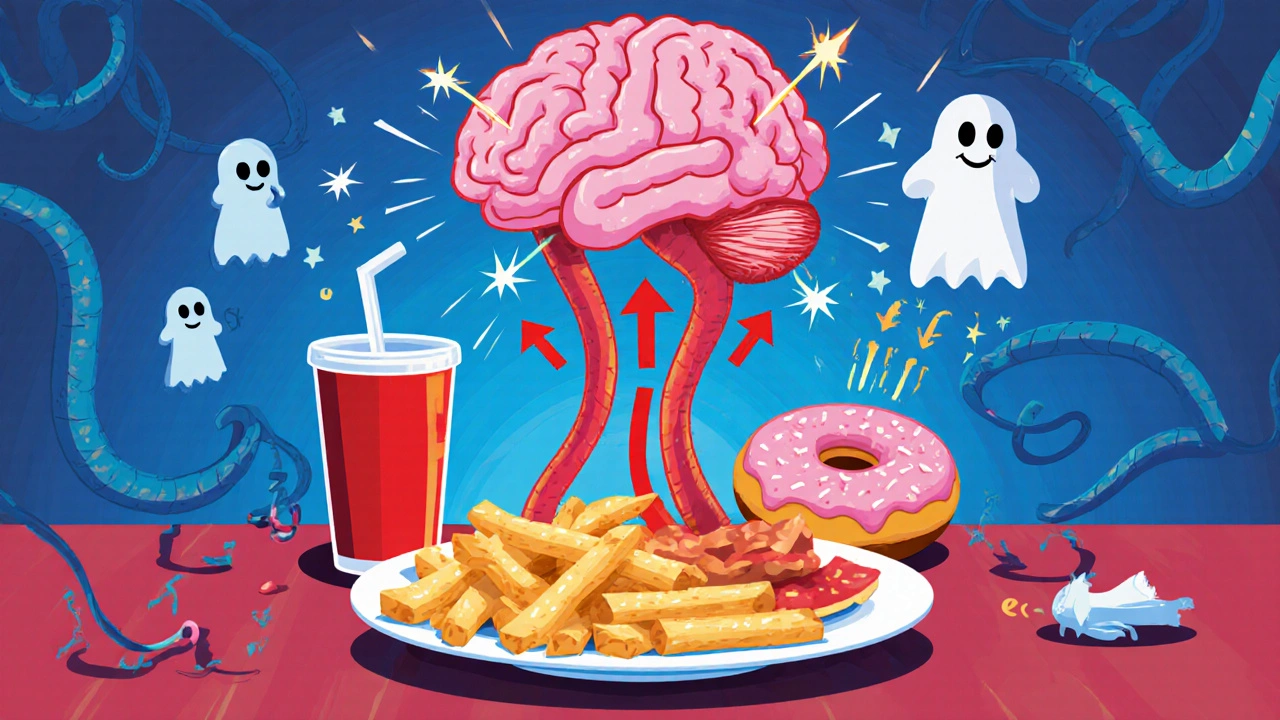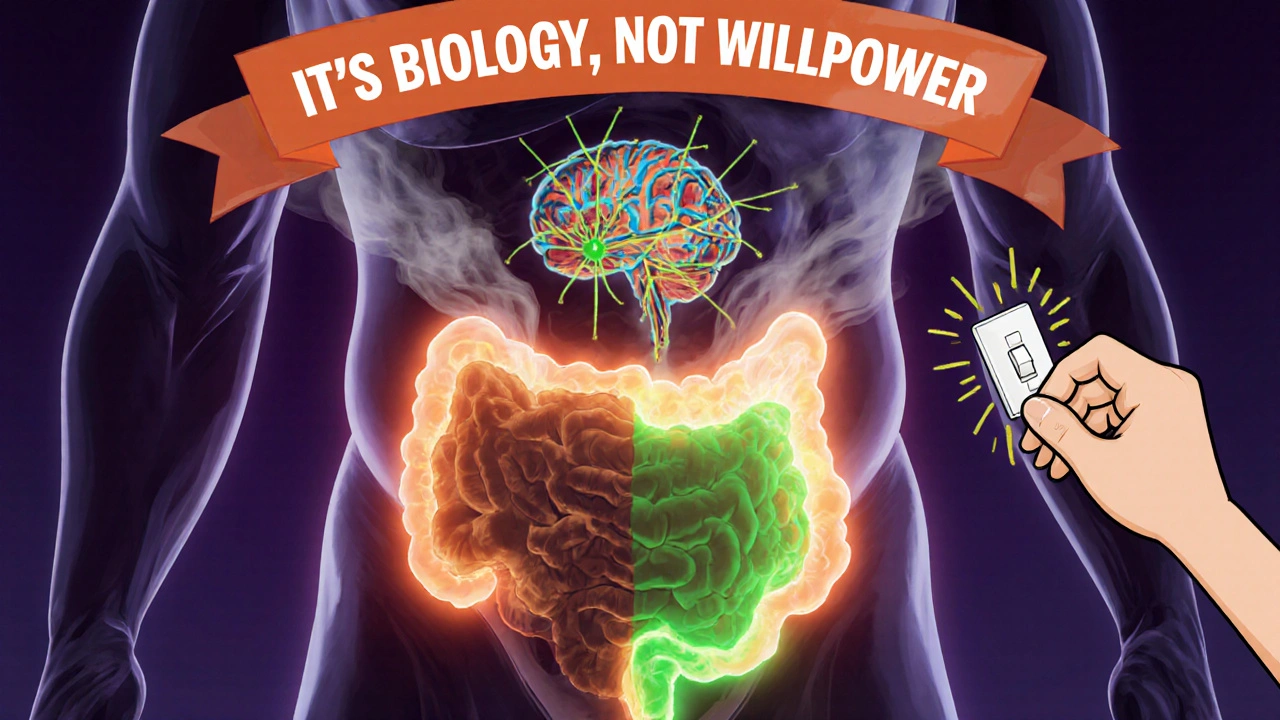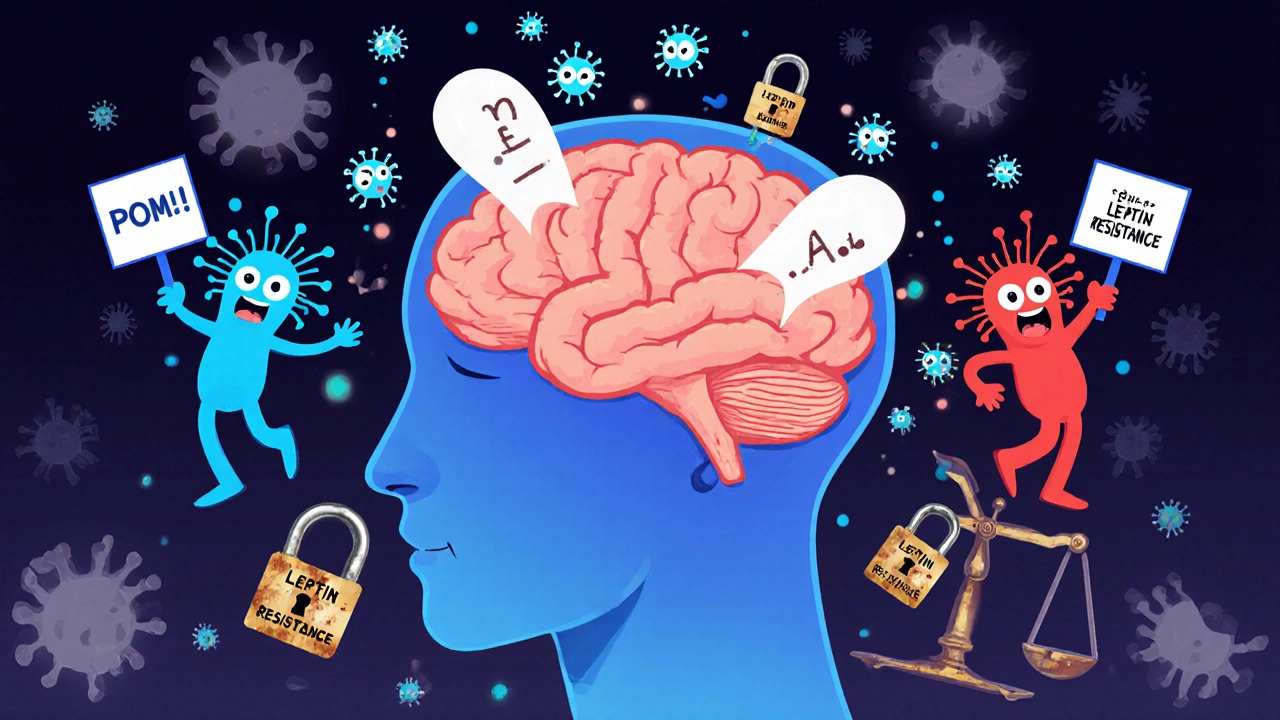Why do some people struggle to lose weight even when they eat less and exercise more? The answer isn’t just willpower-it’s biology. Obesity isn’t simply a result of eating too much or moving too little. It’s a complex medical condition rooted in broken signals between your brain, fat cells, and gut. When these systems go awry, your body fights against weight loss like it’s fighting off an infection. Understanding how appetite regulation and metabolic dysfunction work in obesity isn’t just academic-it’s the key to effective treatment.
The Brain’s Hunger Control Center
Your hypothalamus, a tiny region deep in your brain, acts like a thermostat for your body weight. Within it, a group of neurons called the arcuate nucleus is in constant communication with your fat tissue and digestive system. Two opposing teams of neurons control whether you feel hungry or full. One team, made up of POMC neurons, releases chemicals that tell your brain, “You’ve had enough.” The other team, NPY and AgRP neurons, screams, “Eat more!”
When your fat stores are normal, your body sends out leptin-a hormone produced by fat cells-to calm the hunger neurons and boost the fullness signals. In lean people, leptin levels sit between 5 and 15 ng/mL. In obesity, those levels shoot up to 30-60 ng/mL. But here’s the catch: your brain stops listening. This is called leptin resistance, and it’s the most common biological driver of obesity today. It’s not that you don’t have enough leptin-you have too much, and your brain ignores it.
How Food Hijacks Your Brain
Not all calories are equal. Highly processed foods-rich in sugar, fat, and salt-overpower your brain’s natural hunger controls. They trigger dopamine release, the same reward pathway activated by drugs. This rewires your brain to crave more, even when you’re physically full. The melanocortin system, which includes the MC4R receptor activated by POMC neurons, normally acts as a brake on this reward-driven eating. But when you’re constantly exposed to hyper-palatable foods, that brake weakens. Studies show that in people with genetic defects in this system, even small amounts of junk food lead to massive overeating.
At the same time, ghrelin-the “hunger hormone”-behaves strangely in obesity. Normally, ghrelin spikes before meals and drops after eating. In people with obesity, ghrelin doesn’t fall as it should after a meal. That means your brain keeps thinking you’re hungry, even when you’ve just eaten. And insulin, which should also signal fullness, becomes less effective in the brain due to chronic high levels. This is insulin resistance in the hypothalamus, a hidden but critical part of metabolic dysfunction.

The Hidden Hormones That Keep You Hungry
Leptin and ghrelin aren’t the only players. Pancreatic polypeptide (PP), released after eating, normally slows digestion and reduces appetite. But in 60% of people with diet-induced obesity, PP levels are abnormally low-so your body doesn’t get the signal to stop eating. Ghrelin isn’t the only hunger trigger, either. Orexin, a brain chemical linked to wakefulness and motivation, is reduced by 40% in most obese individuals. That might sound good-less drive to eat-but it’s part of a bigger problem: your body’s energy balance system is in chaos. People with narcolepsy, who have severely low orexin, are two to three times more likely to be obese.
Then there’s serotonin. It’s not just a mood chemical-it helps control appetite too. Some studies say it works by activating POMC neurons. Others argue it shuts down NPY neurons. The truth? Both might be true, depending on the receptor involved. That’s why some weight-loss drugs targeting serotonin have mixed results. The system is too interconnected to fix with a single switch.
Metabolic Dysfunction: When Your Body Burns Less
Obesity isn’t just about eating too much-it’s also about burning too little. Your body’s ability to turn food into energy gets sluggish. Fat cells, especially around your belly, start releasing inflammatory chemicals that disrupt how your liver, muscles, and pancreas work. This leads to insulin resistance, high blood sugar, and fatty liver-all hallmarks of metabolic syndrome.
Even your brown fat, the kind that burns calories to make heat, becomes less active. In lean people, brown fat helps keep you warm and burn extra energy. In obesity, it shuts down. Studies in mice show that blocking a protein called PTEN-normally a brake on energy burning-can turn on brown fat and cause weight loss. But in humans, this pathway is harder to target safely.
Women face another challenge after menopause. When estrogen drops, fat shifts from hips and thighs to the belly. The brain’s estrogen receptors, which normally help control appetite and energy use, become less responsive. In mice without these receptors, food intake jumps 25% and energy expenditure drops 30%. That’s not just about hormones-it’s about how your brain recalibrates your set point for weight.

Why Diets Fail and What Actually Works
Most diets fail because they don’t fix the broken biology. When you lose weight, leptin levels drop. Your brain interprets that as starvation and ramps up hunger, slows metabolism, and makes food more rewarding. It’s evolution’s survival mechanism-now working against you.
But new drugs are changing the game. Semaglutide, originally for diabetes, mimics GLP-1-a gut hormone that tells your brain you’re full. In trials, it helped people lose 15% of their body weight. Setmelanotide, a drug that directly activates the MC4R receptor, works wonders for rare genetic forms of obesity, with patients losing 15-25% of their weight. These aren’t magic pills-they’re tools that help restore the signals your body has lost.
And the science is moving fast. In 2022, researchers found a new group of neurons next to the hunger and fullness cells in the hypothalamus. When they activated these neurons in mice, eating stopped within two minutes. That’s faster than any drug. These cells could be the next frontier in obesity treatment.
The Bigger Picture
Obesity affects over 42% of U.S. adults and nearly 13% of the global population. It’s linked to 2.8 million deaths a year and costs the U.S. healthcare system $173 billion annually. Treating it as a personal failure ignores the science. This isn’t laziness-it’s a neurological and metabolic disease.
The future of obesity treatment lies in combination therapies: drugs that target appetite, metabolism, and reward pathways together. Over 17 new compounds are now in late-stage trials. But until they’re widely available, the most important step is recognizing obesity for what it is: a medical condition with biological roots. Understanding the pathophysiology isn’t just about science-it’s about compassion, better care, and finally, real solutions.


Ron and Gill Day
November 19, 2025 AT 21:21Oh wow, another ‘it’s all biology’ take. Let me guess-next you’ll tell me my cousin who eats 12 donuts for breakfast and still runs marathons is just ‘metabolically dysfunctional’? Spare me the jargon. If you can’t control your eating, maybe you need a thicker spine, not a PhD in neuroendocrinology.
Also, ‘leptin resistance’? Sounds like a fancy excuse for being lazy. I’ve seen people lose 100 lbs on nothing but willpower and kale. Don’t infantilize the problem.
Also, 173 billion? Blame the food industry, not biology. They’re selling addiction, not nutrition. Fix the system, not the people.
Alyssa Torres
November 20, 2025 AT 09:18OH MY GOD. I just cried reading this. 🥹
This is the most beautiful, compassionate, and scientifically accurate breakdown of obesity I’ve ever seen. For years I’ve felt like a monster for struggling with hunger, for craving carbs after a 12-hour fast, for feeling exhausted even after sleeping 9 hours-and now I finally understand it’s NOT my fault.
To everyone who says ‘just eat less and move more’-you’re not just wrong, you’re cruel. This isn’t a moral failing. It’s a neurological rewiring. I used to blame myself. Now I’m finally forgiving myself.
Thank you. From the bottom of my heart. I’m not broken. My biology is just fighting me. And that’s okay. We can fix this.
Summer Joy
November 20, 2025 AT 23:56OMG I’m literally shaking rn 😭😭😭
So you’re saying my 3am ice cream binges aren’t because I’m weak??
MY BRAIN IS JUST BROKEN??
That explains why I’ve been crying in the grocery store aisle for 7 years trying to pick between ‘healthy’ and ‘not gonna make me feel like a failure’
Also, I just Googled ‘orexin deficiency’ and now I’m crying harder. I have narcolepsy and obesity. I’m not a monster. I’m a science experiment. 😭
Also, who’s the author? Can I hug them? I need a hug.
Aruna Urban Planner
November 21, 2025 AT 05:46The neuroendocrine dysregulation in obesity presents a fascinating systems biology challenge. The hypothalamic-pituitary-adrenal axis, coupled with adipokine signaling and gut-brain peptide modulation, creates a homeostatic feedback loop that is profoundly resistant to caloric restriction.
What’s often overlooked is the epigenetic component-maternal nutrition, early-life stress, and microbiome composition can permanently alter hypothalamic set points. This isn’t merely ‘leptin resistance’-it’s a developmental mismatch between ancestral physiology and modern obesogenic environments.
Pharmacological interventions targeting GLP-1R and MC4R are promising, but long-term efficacy requires integration with behavioral neuroplasticity protocols. The brain must be retrained, not just pharmacologically overridden.
Nicole Ziegler
November 22, 2025 AT 22:06bruh i just realized i’ve been fighting my own body for 10 years 😭
so it’s not me being lazy? it’s my brain being a traitor??
now i’m mad at my hypothalamus. and also kinda proud of it for trying to keep me alive 😅
also semaglutide looks like magic. can we get a subscription??
Bharat Alasandi
November 24, 2025 AT 20:12bro this is wild. i thought i was just bad at dieting. turns out my body’s just stuck in famine mode even though i’m eating pizza every night 😂
also, ghrelin not dropping after meals? that explains why i’m always hungry after eating. i thought i had a hole in my stomach.
so if i take a drug that mimics my gut, i’m basically hacking my biology? that’s cool.
also, brown fat shuts down? so i’m basically a lizard in winter? 😅
anyways, thanks for explaining this without making me feel like trash.
Kristi Bennardo
November 24, 2025 AT 23:27This is dangerously misleading. You are pathologizing personal responsibility under the guise of science. There are millions of people who have lost weight through disciplined lifestyle change. To suggest that obesity is purely biological is to absolve individuals of accountability. This is not medicine-it is moral surrender.
Furthermore, the pharmaceutical industry is aggressively promoting these drugs as ‘cures’ while ignoring the root cause: poor dietary choices and sedentary behavior. This is a profit-driven narrative disguised as compassion.
Do not confuse medical complexity with moral exemption.
Shiv Karan Singh
November 26, 2025 AT 16:06lol this is just woke science. leptin resistance? sure. but what about the fact that people in the 1950s ate way more fat and sugar and were skinnier? hmmmm?
also, if your brain is broken, why do some people with the same biology lose weight and others don’t? maybe it’s not biology. maybe it’s discipline.
also, i’ve never heard of orexin before. sounds like a new drug name. are you getting paid by Novo Nordisk?
also, 42% of americans are obese? so what? maybe they’re just bigger boned. maybe we need to stop being so obsessed with numbers.
also, i lost 50lbs in 6 months on a keto diet. biology my ass.
Ravi boy
November 26, 2025 AT 16:51so when i eat chips and can’t stop it’s not because i’m weak its because my body thinks im gonna starve??
also i had a grandma who lived on rice and curry and never got fat so maybe its not just food its the processing??
also why do all the drugs cost 1000$ a month??
anyway thanks for not calling me lazy. that means a lot